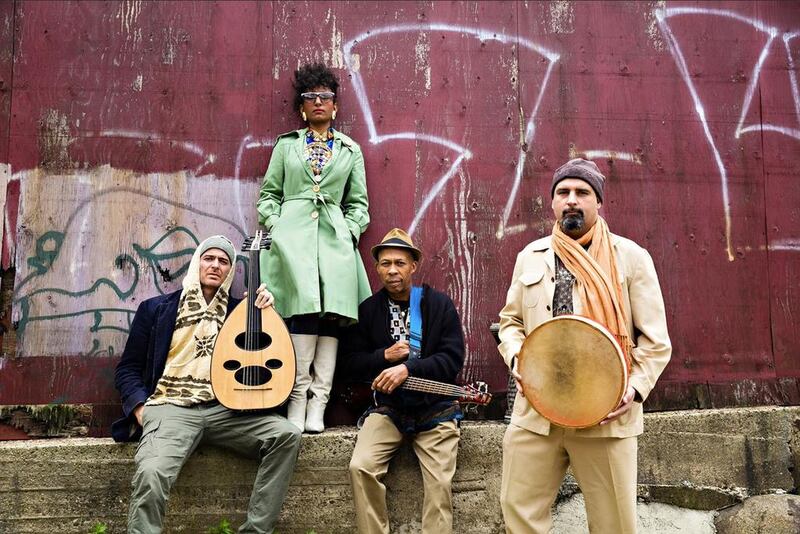“We are a band of immigrants,” says Alsarah, “and music for me is going home.”
It’s a long way home for the New York-based singer, songwriter and leader of Alsarah & the Nubatones, the “Nubian/Sudanese-inspired East African retro-pop” band she fronts, who perform in Dubai on Monday, June 15.
Home, technically, is the Sudanese capital of Khartoum, where Alsarah was born 32 years ago.
“My parents were and still are hard-core political activists,” she says. “They always had issues with the Sudanese government because we went from one dictator to another, really.”
The situation became wholly untenable when the current president, Omar Al Bashir, took power in a coup in 1989.
“There started to be a lot of people in leftist circles who would disappear and turn up in body bags,” Alsarah remembers.
At the age of 8, she, her mother and sister fled to Yemen – “because people’s families started showing up in body bags, too”. Her father joined them 18 months later after being smuggled out of their home country.
The family lived in the mountain city of Taiz. But when the 1994 Yemen Civil War broke out, they were suddenly pulled out by the United States-based NGO Alsarah’s mother worked for. “We were evacuated in a military airplane and we landed at a Saudi Arabian airport,” she says. “And they were like: ‘Pick a place to go, because you can’t stay here.’ We ended up coming to the States randomly.”
Arriving in Boston, the family applied for political asylum and mother, father and both daughters all enrolled in studies.
“It was really hard for us for a very long time and it took a lot of deliberate family loving and therapy for all of us to come to terms with the trauma we all went through,” says Alsarah. “It also made me really strong – it made me realise just how unlucky most people are. I was coming out of all this turbulence, but I was the lucky one. That’s the most powerful thing I walked away with – the only thing that separates you and that other person is just pure luck sometimes. And the guilt of that is sometimes hard to deal with.”
Throughout that period of turbulence, there was always music. Bootleg cassette tapes bought in Yemen; the casual piano lessons received from a family friend on a cheap, half-sized keyboard.
In 2000, Alsarah enrolled in the liberal-arts college Wesleyan University, studying music and ethnomusicology full-time for four years. Originally excited by the academic study of music, Alsarah moved to New York in 2004 and began performing publicly for the first time – paying bills by working in a dance studio, real-estate office, costume shop, mental institution and plenty of waitressing.
“Music was kind of like my home, my expression, my way of learning about the world,” Alsarah says. “Moving around from place to place made me fascinated with other people; it makes you realise that everyone has their own culture, something specific to them. Music was always my way of interacting with people and interacting with myself, processing things. That’s the reason I kept going back to the East African sound – it was my way of going home.”
In this context, it’s easy to see Alsarah & the Nubatones as a coming together of cultures, both personally and politically. The group were formed four years ago when Alsarah met Egyptian/Quebecian percussionist Rami El Aasser, performing together in a band with a repertoire of love songs from Zanzibar from the 1940s to 1970s.
Bonding over a monthly "supper club" session – "where we would hang out, talk about music and cook insane amounts of food" – the pair decided to revisit the classic Nubian pop music of the 1960s and 1970s, especially the Arabic Songs of Return, which came after hundreds of thousands were displaced by Egypt's Aswan High Dam, built in 1970 to control the flooding of the Nile.
Bassist Mawuena Kodjovi, from “Togo via France”, and established oud player Luthier Haig Manoukian, of Armenian descent, were soon recruited. (Manoukian died last year and has been replaced by New Yorker Brandon Terzic).
This cross-culture quartet evolved their own distinct take on the sounds of 1970s Sudan and Egypt, adopting a distinctly retro ethos based on strict pentatonic forms, but dealt the edge of New York City life. On last year's compelling debut album, Silt, modern production can't extinguish the timeless sense of longing in the music. The group are currently spending a summer in Cairo to work on a follow-up.
“I always tell people I feel like my number-one identity is as an immigrant,” says Alsarah. “The band is a hodgepodge of immigrants, everybody is from somewhere else, and that’s a huge part of the sound you’re hearing.
“When you’ve had that relocation experience, it cuts across any cultural line. You learn what it takes to pick up your roots and drop ’em down somewhere else – how you navigate the borders and concepts of identity – it becomes really interesting. And complicated. It’s creating a much more global creature in the process.”
• Alsarah & the Nubatones perform at The Music Room, Majestic Hotel Tower, Bur Dubai, on Monday, June 15. Doors open at 8pm; Dh100 (ladies free before 9pm)
rgarratt@thenational.ae





